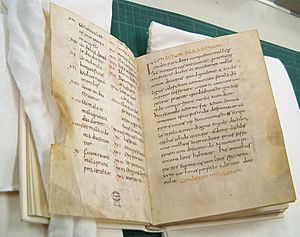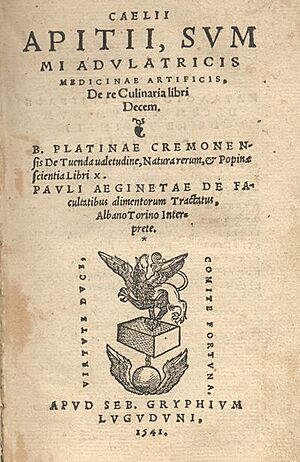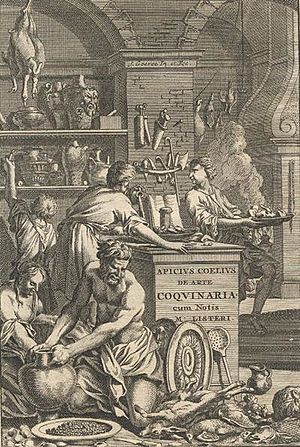Apicius facts for kids
Apicius, also known as De re culinaria or De re coquinaria, is a very old collection of Roman cooking recipes. Its name means "On the Subject of Cooking." People believe it was put together around the 5th century AD.
The book uses a mix of old, formal Latin and more common, everyday Latin. This suggests that some recipes are older than others.
Contents
Who Wrote This Cookbook?
The book is named after someone called Apicius. Some think it was written by Marcus Gavius Apicius. He was a famous Roman gourmet (someone who loves good food) who lived around the 1st century AD.
However, no one is completely sure who wrote it. It might have been put together by many different Roman cooks over time. Some experts believe the version we have today was finished in the 5th century.
How the Book is Organized
The Latin text of Apicius is divided into ten books. Each book has a Greek title, like chapters in a modern cookbook.
- Epimeles — The Careful Housekeeper (about keeping a good kitchen)
- Sarcoptes — The Meat Mincer (about ground meat)
- Cepuros — The Gardener (about vegetables)
- Pandecter — Many Ingredients (about dishes with lots of different things)
- Ospreon — Pulse (about beans and peas)
- Aeropetes — Birds (about poultry like chicken)
- Polyteles — The Gourmet (about fancy dishes)
- Tetrapus — The Quadruped (about four-legged animals like beef or pork)
- Thalassa — The Sea (about seafood)
- Halieus — The Fisherman (about fish)
What Foods Did Romans Eat?
The recipes in Apicius help us understand what people ate in the ancient world. Especially those living around the Mediterranean Sea. But these recipes were mostly for very rich people.
Some recipes even include unusual ingredients for that time, like flamingo!
A Sample Roman Recipe
Here is an example recipe from Apicius, simplified for you:
- Hot kid or lamb stew.
- First, put pieces of meat (either lamb or young goat) into a pan.
- Chop an onion and coriander very finely.
- Then, crush pepper, lovage, cumin, garum (a salty fish sauce), oil, and wine.
- Cook everything together.
- Pour the stew into a shallow dish.
- Thicken it with wheat starch.
- If you use lamb, add the crushed spices and sauce while the meat is still raw. If you use kid (young goat), add them while it is cooking.
Later Versions of Apicius
There is also a shorter version of the book called Apici excerpta a Vinidario. This was like a "pocket Apicius" for quick reference. It was made much later, during the Carolingian era.
This shorter book is not just a copy of the longer Apicius. It has some new recipes. This means the book changed over time as people used and adapted it.
The first printed versions of Apicius appeared in the late 1400s. Many more editions were printed in the years that followed. This shows how popular the book was.
The First English Translation
The book was not translated into many languages for a long time. The first translation into Italian was in 1852. Later, it was translated into German and French.
The first time Apicius was translated into English was in 1936. This translation was done by Joseph Dommers Vehling and was called Cookery and Dining in Imperial Rome. You can still find copies of it today!
See also
 In Spanish: De re coquinaria para niños
In Spanish: De re coquinaria para niños
 | Shirley Ann Jackson |
 | Garett Morgan |
 | J. Ernest Wilkins Jr. |
 | Elijah McCoy |




